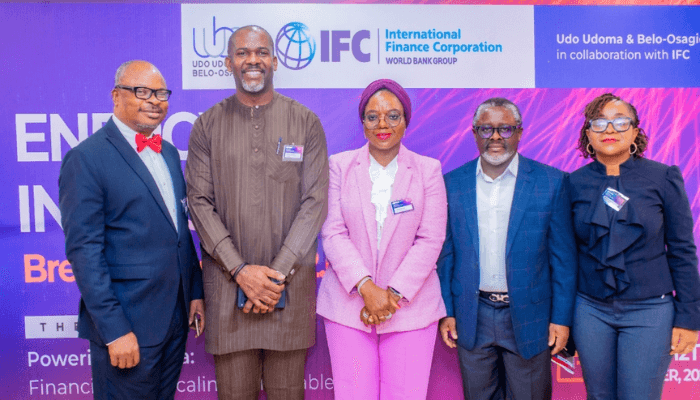Udo Udoma & Belo-Osagie (UUBO) and the International Finance Corporation (IFC) have convened stakeholders in Lagos to chart strategies for scaling renewable energy in Nigeria, as the country grapples with the world’s largest electricity access deficit.
At the 2nd Energy and Infrastructure Breakfast Session themed “Powering Nigeria: Financing and Scaling Renewable Energy”, participants highlighted the urgent need for public-private partnerships, innovative financing models, and policy reforms to accelerate clean energy deployment and close the power supply gap.
Nigeria currently has 85 million people without access to electricity, representing about 40 percent of the population. IFC noted that solving this challenge is not just an economic imperative but also a social and environmental one.
“Powering Nigeria is one of the most important things we can do because it’s not just an economic opportunity, it’s a social opportunity,” Lesley Denyes, Regional Head of Operations at IFC, said.
She highlighted the corporation’s flagship Mission 300 programme aimed at connecting 300 million people across Africa to electricity in partnership with the World Bank and the African Development Bank.
The IFC disclosed that its first flagship project under Mission 300 was signed in Nigeria, which seeks to provide 17.5 million people with electricity access.
It has also extended an $80 million loan to Sunking for the distribution of home solar systems across the country. However, the corporation stressed that bridging the gap will require over $4.1 billion in private investment by 2030.
Stakeholders at the seminar agreed that, alongside funding, regulatory clarity, technical know-how, and consumer sensitisation remain central to scaling the renewable ecosystem. They stressed that investor confidence and public awareness of clean energy’s benefits are critical to unlocking opportunities in the sector.
Read also: UUBO, Lex Mundi explore intersections between legal, policy imperatives at General Counsel summit
Chijioke Okonkwo, Chairman/Chief Executive Officer of the Enugu State Electricity Regulatory Commission, said states must seize the opportunities created by the Electricity Act 2023, which decentralised electricity generation and distribution.
“The national grid does not have the capacity to supply adequate power to the entire population,” Okonkwo said. “The Electricity Act effectively opened the door for states’ participation across the entire power value chain to complement federal efforts.
“This initiative has led to the wholesale electricity market and decentralised sub-national electricity markets working together.”
He added that states could tap locally available natural resources, adopt innovative technologies, and establish investment-friendly regulations to build commercially viable renewable energy projects.
On his part, Nicholas Okafor, Partner and Head of the Energy and Infrastructure Practice at UUBO, stressed the transformative power of ideas in shaping infrastructure development.
“Ideas are like diamonds, but unlike diamonds, they contain the creative force to transform societies,” he said. “Our practice group has worked with clients globally to turn ideas into tangible projects, from power plants and toll roads to solar farms and bridges. When properly harnessed, these ideas drive growth and create lasting impact.”
The IFC explained that its strategy in Africa hinges on leveraging its own capital to crowd in additional private investment. With a current leverage ratio of 1.34, every dollar the IFC invests mobilises $1.34 from other investors, including multilateral development banks and local financial institutions.
Despite investing $31 billion globally in renewable energy, the IFC acknowledged that much more is needed to accelerate clean energy deployment, reduce risks, and reach those most in need.
“Access to energy is not just about electricity, it supports families, health, education, small businesses, and jobs. It is the foundation of social development,” IFC said, reaffirming its long-term commitment to Nigeria’s energy transition.

